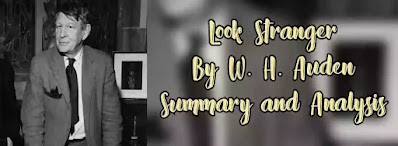Also Read
Introduction:
Auden's poem Look Stranger starts with the idea of being informative and ends with a sentimental tone. It is a lyrical poem. The poem invites its reader to enter the world of the non-human with all our senses awake.
Summary
The poem Look Stranger starts with the idea of being didactic, and ends in being almost romantic. It is certainly lyrical as a whole. The stranger is speaking to and for other native strangers. The poem Look Stranger, reveals that some quester had arrived at his destination without knowing it, and the quest is more psychological than physical. Then our assumption seems quite possible. If we remember Auden's fondness for paradox, it becomes highly probable. The poem exists for more as a hum of reverberations than a structure of statements, even metaphorical ones. The last stanza of the poem implies winter, and between the physical and the mental: we start with light and end with enlightenment or, looking becomes a memorable vision. Stress is laid on the quest-seed. This seems to be an expression of the successful quest, the partial view passed into the full view, opposed elements having been harmonized in a balanced delight, and the 'stranger' comes home to himself and his land, for the moment, as the gull lodges a moment.
Critical Appreciation and Analysis
Auden's preoccupations seem to be scattered in this poem. We the reader are at a border between two worlds in space, those of land and sea; between the two seasons of summer and winter, between the physical and the mental. The most amazing thing about this poem is the way the imagery, and even the consonants and vowels, are carefully chosen for their sound effects.
There is a fusion of visual and aural in such phrases as: "May wander like a river. The swaying sound of the sea?" One has only to read aloud such cluster of visual, visual-aural and tactile effects as chalk walls falls, or "the pluck and knock of the tide", to be reminded of the pure word-music experiments of Edith Sitwell.
Auden in this poem evokes a mood of reverie or contemplation, in which the speaker, characteristically remote from the distant ships like floating seeds, becomes immersed in the rhythms of nature. The technical device Auden has used in this poem has made the poem an inexplicable wonder.
To quote a critic, "the poem starts with the idea of being didactic, and ends in being almost romantic. Lyrical it certainly is, as a whole for the public view of the opening soon dissolves into the sort of musing that we think of as particularly characteristic of a lyric - verse that is not so much listened to as overheard. 'stranger', who is he? Can he really be a foreigner, taken to the cliffs of Dover and exhorted to admire England? Surely not; a person so insensitive would hardly be capable of the inward, musing beauty of the last stanza. Perhaps it is simply the reader, invited to witness a transformation scene, for the first two lines suggest the spotlights of a theatre, and the discovering rising of the curtain, almost as much as they suggest dawn. There's a sense of a show being put on, for your delight."
In the poem Look Stranger, it seems that some quester had arrived at his destination without knowing it. The quest is more psychological than physical. We - the readers start with light and end with enlightenment. It is a successful quest, as the partial view passed into the full view.
